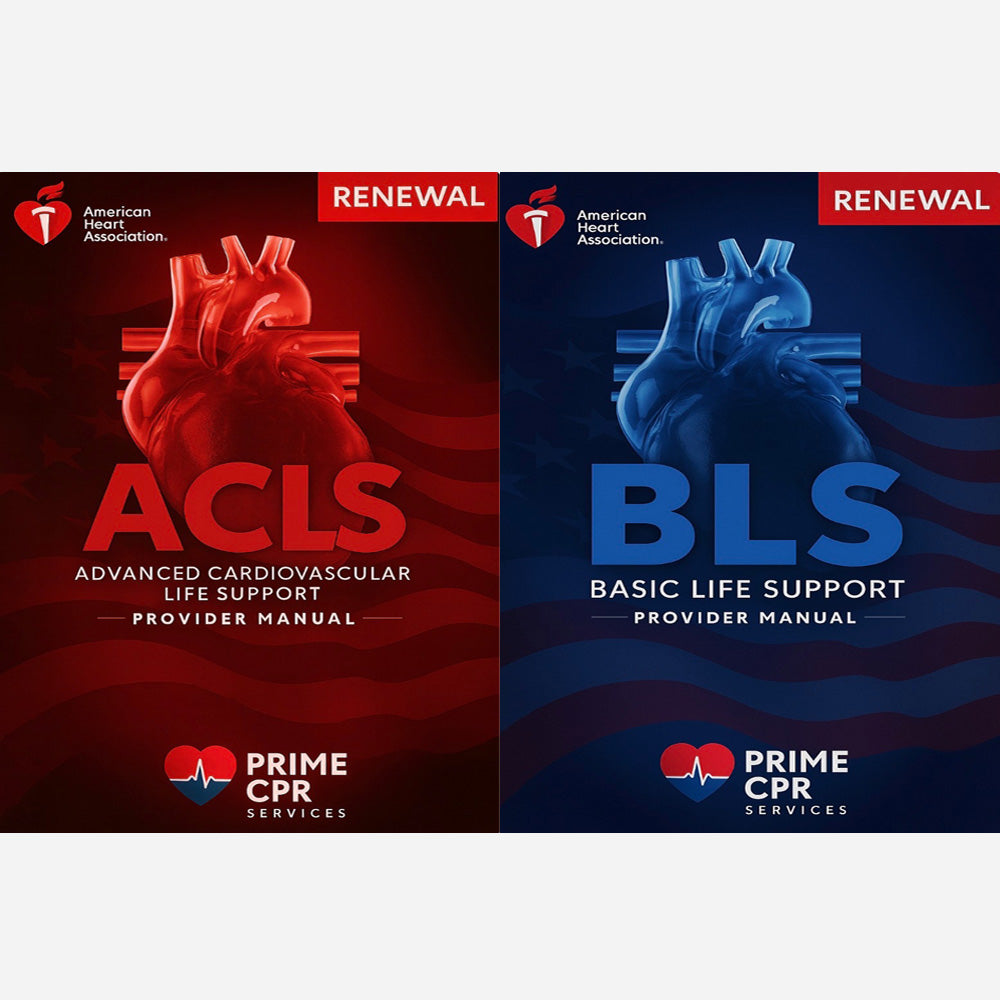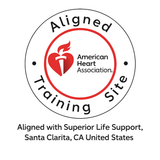ACLS Renewal: Essential Training for Healthcare Providers
Renew your ACLS and BLS classes with ease!ACLS RENEWAL with BLS RENEWAL is the perfect pairing to secure your medical profession's needs. You will receive both your ACLS and BLS card right after class.
Prime CPR Services teaches the AHA ACLS RENEWAL (Advanced Cardiac Life Support) course together with the BLS (Basic Life Support for Healthcare Providers) renewal course with the latest guidelines from the American Heart Association for Cardiopulmonary Resuscitation and Emergency Cardiovascular Care. Designed for healthcare experts in emergency, intensive care, critical care, surgery, and pre-hospital settings, the course caters to physicians, nurses, paramedics, respiratory therapists, and others managing cardiovascular crises. Our teaching method ensures uncomplicated comprehension and easy retention, making learning and recall effortless.


If you need any books, we ship priority, so you receive them well in advance of your scheduled class. You may also consider alternative book options by getting aACLS ebook by clicking HERE and/or the BLS ebook by clicking HERE
ACLS RENEWAL covers the core principles, including:
- BLS Review: Basic Life Support (BLS). 1 and 2 Rescuer High-quality CPR for adults, children, and infants, use of a Bag Valve Mask (BVM), use of an Automated External Defibrillator (AED), and relief of choking.
- Systematic Approach: Assessment, Identification of rhythms, and appropriate interventions. Effective team dynamics, Roles and Responsibilities during a resuscitation, Management of a patient in cardiac arrest or other cardiovascular emergencies.
- Rhythm Recognition and Scenarios: Ventricular Fibrillation (VF) and Pulseless Ventricular Tachycardia (VT), as well as non-shockable rhythms like Asystole and Pulseless Electrical Activity (PEA). Sinus Bradycardia and Supraventricular Tachycardia (SVT)
- Electrical Therapy: Defibrillation, Cardioversion, and Pacing.
- Pharmacology: Indications, Dosages, and Administration routes of Atropine, Amiodarone, Adenosine, Epinephrine, and Dopamine.
- Post-Cardiac Arrest Care: Critical care following Return of Spontaneous Circulation (ROSC), including targeted temperature management and other post-cardiac arrest interventions.
BLS RENEWAL covers the following:
- AHA’s Chain of Survival for Improved Survival from Cardiac Arrest in Adults, Children, and Infants
- Assessment: Adult, Children and Infants Prior to CPR
- CPR: High-Quality 1 and 2 Rescuer CPR and AED for Adults, Children, and Infants
- Ventilation: Barrier Device, Bag Valve Mask (BVM) and Advanced Airway in Place
- Team Dynamics: Importance of Teams in Multi-Rescuer Resuscitation and Performance.
- Choking: Relief of Foreign-Body Airway Obstruction (Choking) for Adults, Children, and Infants
- Narcan: The Use of Narcan for Opiate Overdoses
Feel free to call, text or email us if you have any questions or concerns.
Why ACLS Renewal is Important?
ACLS renewal is crucial for healthcare providers to stay updated on advanced cardiac life support techniques. This course equips you with the skills needed to manage critical situations effectively. You'll learn about the latest protocols, and procedures, and receive hands-on practice. Therefore, participating in this renewal course not only keeps your certification valid but also ensures you are prepared to save lives when it matters most.
Benefits of Combining ACLS with BLS Training
By renewing your ACLS certification alongside Basic Life Support (BLS), you receive comprehensive training that enhances your emergency response skills. BLS provides foundational knowledge in CPR, which complements advanced methods learned in ACLS. The combination ensures you are well-prepared for various medical emergencies, and this integrated approach helps healthcare providers respond effectively in high-pressure situations.
Course Structure and Requirements
The ACLS renewal course, including BLS, typically consists of lectures, interactive sessions, and practical simulations. Participants must demonstrate competency in lifesaving techniques. The renewal process usually takes around a day, but course durations can vary. After successful completion, you will receive updated certification credentials, which are vital for maintaining your role in patient care and emergency response.



